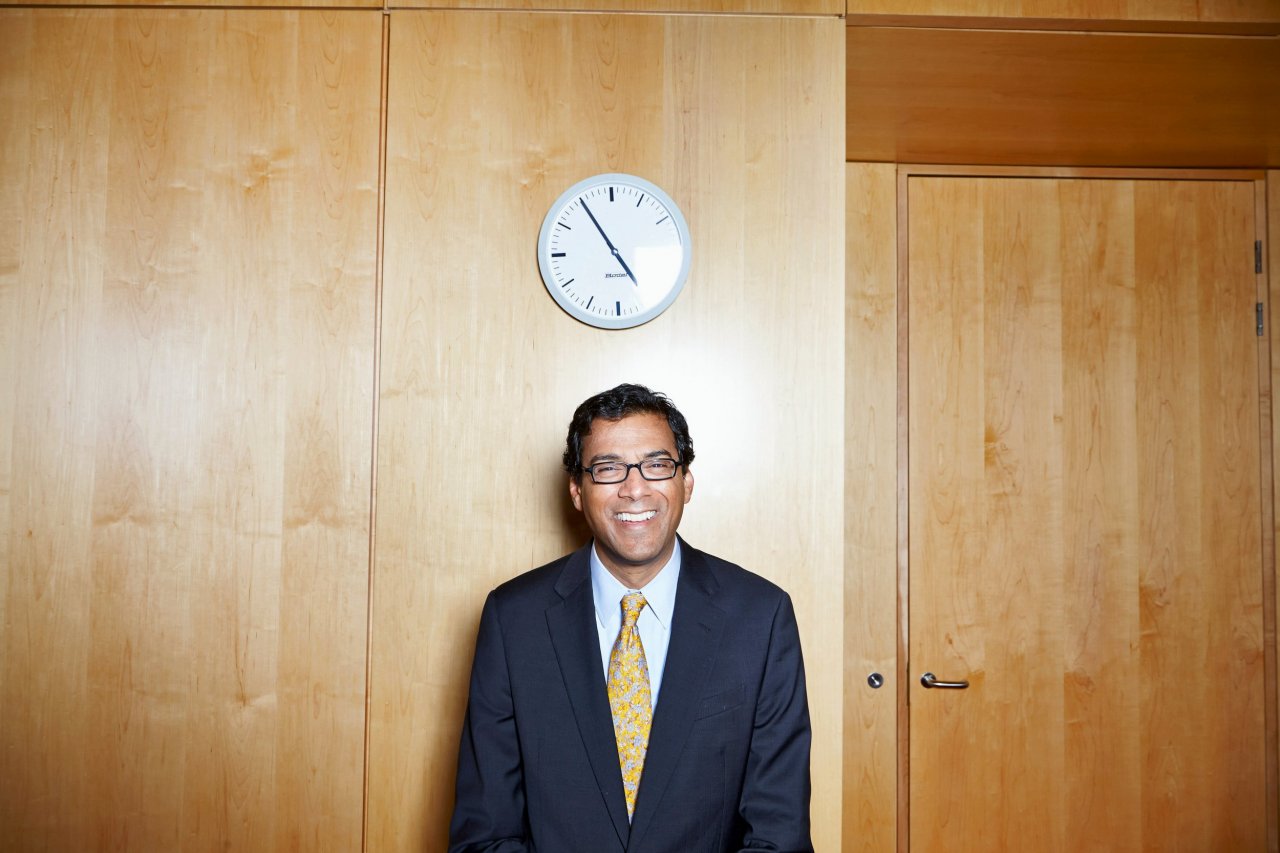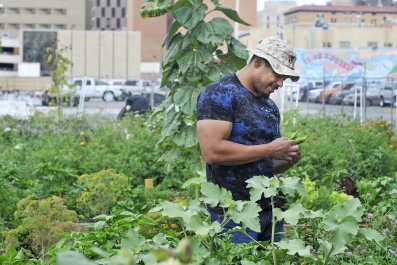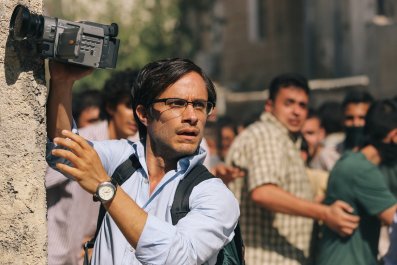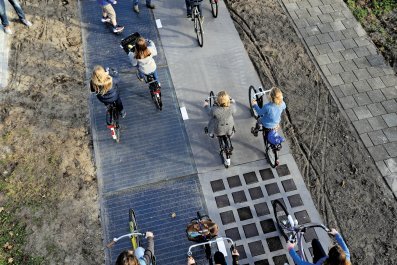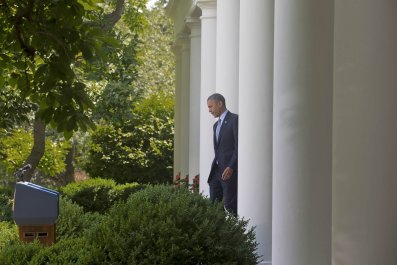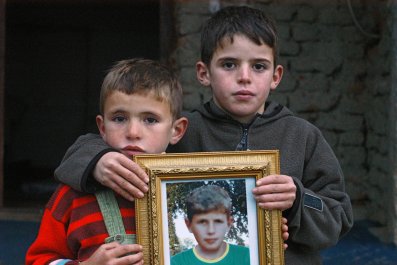It is said that victorious Roman generals, on city parades following battlefield triumphs, would be followed by a servant. "Memento Mori," the servant would say over and over. "Remember that you have to die." Later, still-life paintings were punctuated by symbols of the finite – rotting fruit, wilting flowers, bubbles – as reminders of life's transience. Early self-help books, with titles like The Waye of Dying Well and The Sick Mannes Salve, went further, instructing readers of their times on how to manage impending death. This is a literary tradition that has now largely disappeared. The 21st-century bookshop contains many volumes on how to live better; far fewer on how to die better.
It is with the latter that Atul Gawande's book Being Mortal: Medicine and What Matters in the End concerns itself. In a back room at the Royal Society of Edinburgh, he proffers a surgeon's hand, dexterous and delicate. In a few hours he will give the third of his series of four BBC Reith lectures on The Future of Medicine, broadcast worldwide on the BBC. Gawande alternates endocrine and general surgery with writing for The New Yorker magazine. His articles address issues at the interface of medicine and public policy, and have spawned four New York Times bestselling books. His latest asks the question, how we can better deal with the frailty of age, the onset of illness, and approaching death?
In Western societies, death is increasingly obscured from view. The highly visible, indiscriminate version of mortality we have recently seen in West Africa as a result of the Ebola outbreak – a spectre hanging over packed hospital queues and quarantined communities, chasing old and young, rich and poor alike – now seems remote and shocking to most people living in developed countries. Modernity has transformed perceptions of mortality.
"The striking thing is that if you go back to the 19th century and before, people were at risk of dying at every moment in their lives," Gawande says. "Families were bigger because you would lose a child, commonly, sometime through childhood. Mothers would die in childbirth". Basically, in this earlier era, advanced age did not connote a special risk of death. "Being alive was associated with a special risk of death! Now we can live our lives without really feeling our lives are fragile at all. Without feeling there are limits to what we can do."
The ability to look forward with confidence to a long life is perhaps the greatest and most under-appreciated privilege of modern life. Men and women in Western societies can both now expect to live into their ninth decade. The number of centenarians in the UK has risen by 73% over the past 10 years. We are in the midst of a huge demographic shift. The number of people across the world over the age of 65 will triple by 2050. This shift brings problems on the macro level. A higher proportion of old people generally means slower economic growth, as the productivity of the working-age population is relied upon to support the old. In the US, nearly 30% of Medicare dollars are now spent on patients who have less than six months to live; 5% of Americans account for half of public health expenditure. In the UK, two thirds of National Health Service clients are aged 65 and over.
On the individual level, however, it seems a good time to grow old. The risk of succumbing to early or sudden death has receded. Modern medicine and social care has lengthened our horizons to an extent unimaginable, even to our fairly recent ancestors. However, the corollary of life no longer being, in Hobbesian style, "nasty, brutish and short," is that the process of dying is likely to be clinical, institutionalised and long. With religion decreasing in Western societies, death no longer represents an ellipsis but a full stop. The fear now lies not in death itself, but in our depreciation
It is the challenges of this long prelude and final call that Gawande describes in vivid detail. Simple devices do not age, they rather operate until a major component fails. But humans are not simple. We fail as complex systems do; randomly and gradually. "In truth no single disease leads to the end," Gawande writes. "The culprit is just the accumulated crumbling of our bodily systems while medicine carries out its maintenance and measures and patch jobs." He describes reaching inside an elderly patient during surgery, where the major vessels "feel crunchy under your fingers".
BURDENED BY AGE
Characteristic of Gawande's clear prose and recurring throughout our conversation is a cast of memorable characters, empathetically rendered, anecdote lending life to his analysis. The Gawande family patriarch, grandfather Sitaram, lived to 110 years old, riding his horse daily across the farm right up until his death. "In contemporary societies", Gawande writes, "old age and infirmity have gone from being a shared, multigenerational responsibility to a more or less private state – something experienced largely alone or with the aid of doctors and institutions." Our end is decided "by the imperatives of medicine, technology and strangers."
It's hard to hear Sitaram's story and not conclude that he had the best of possible deaths – he was a venerated patriarch, his family gathered around him. In the now receding India Gawande describes, the signs of old age are seen as badges of honour, the old are valued not just for what they have done in the past, but for what value their experience offers in the present. But while he draws on his family's past with some affection, Gawande quickly punctures any attempt to romanticise it.
"Prosperity in modernity comes from breaking up that multi-generational family unit." The fact, as Gawande sees it, is this: "As soon as people have money and have pensions that allow them some freedom, the elderly move out from the kids and the kids move out from the elderly. The old don't want to live under the rules of the sons and daughter, and the sons and daughter don't want to live under the rules of the old."
As he describes it, this parting of ways demonstrates not the abandonment of the old by the young, but is rather the consequence of a shared thirst for independence that has demoted the multi-generational family. "Some have defined us as living in an era where we have the cult of the young, where we have displaced the old. But more and more I think we rather have a cult of the self, that independence is what we, the individual, hold up as highest."
The value that we place on independence seems also to produce a corresponding fear of infringing on the independence of others: "My grandfather, he would have taken it for granted that he was not a burden on the family, he was living a fulfilled life and they saw a great joy that he was being able to prosper even at over 100 years of age." Yet now, for most elderly people, their biggest concern is that they will be a burden. In the Netherlands, the number of people choosing assisted suicide has risen to 3–4%. While Gawande cautiously supports assisted dying in very limited circumstances, this statistic attracts his concern. "The most common reason is not because of physical suffering. It's because of not wanting to be a burden on their family." This, to Gawande, is indicative of a failure of care.
His basic thesis is this: "We decided that mortality is a medical problem, and then once we did that we put it in a realm of place where your health and safety are the most important thing, and this is just another condition to solve with our usual priorities in place." He posits that what he calls an "experiment" of making mortality a medical experience over the past few decades, is now failing.
This is an interesting point to hear articulated by a surgeon. After all, it is the act of resisting death that, conventionally, gives medicine meaning. As a surgeon, Gawande's job is to stand between the patient and disease, possibly death. In discussions of illness, we habitually use the language of war. We "fight" disease, "battle" cancer, and in the end, we "concede defeat" or hopefully, "find peace". In waging this war, we validate the life worth saving. However, as a result, modern medicine views death as the ultimate defeat, as a failure. This paradigm, Gawande concludes, leads doctors to prioritise length of life over quality of life. Yet extra years are no boon without enjoyment. Gawande thinks that doctors like him have long had their priorities mixed up. Health and survival should not predominate; well-being is the ultimate goal. In short, medical professionals need to focus less on preventing death, and more on enriched wellbeing for the living.
Gawande describes experiencing something akin to a tale of Damascene conversion: He was initially "attracted to the heroic dimensions of medicine" but, later in life "some of the most gratifying moments of my practice now come from feeling more confident with people that have unfixable problems, and trying to understand how to help them navigate through what the priorities are that we are chasing."
FIXING THE UNFIXABLE
The concept of the unfixable is something that, in earlier times, applied to almost every affliction. The panic seen earlier this year in response to the prospect of Ebola was, to an extent, a result of there being "no cure". As time has passed we have become more confidently interventionist, fully expecting to "be the difference", to find a solution. Google, the ultimate solution makers, have invested billions into seeking a "cure" for ageing. As yet, there remains no app for that. Gawande writes that, "The waning days of our lives are given over to treatments that addle our brains and sap our bodies for a sliver's chance of benefit." These treatments often do not even lengthen life. Indeed, he mentions studies such as one of terminal cancer or end-stage heart failure patients that found those who entered hospice care, forgoing hospital treatments, exhibited no difference in survival rates compared to those who received such treatment. For lung cancer and heart failure, patients in hospice care actually lived longer, with much less suffering.
Later in the evening, responding to questions following his lecture, Gawande will tell the audience something that seems quite staggering. "The most common week of surgery is the last week. The last day is the most common." In other words, the most common week a person will receive surgery is the last week of his or her life, and, in that week, the most common day is the final day. The low probability last chance solutions are still prioritised. To paraphrase Dylan Thomas, we seldom go gentle into that good night; instead, we rage against the dying of the light.
The health system's sometimes myopic focus on preventing death is linked with the imperative of ensuring safety above all other considerations. "We imagine that wishing for someone's safety is the highest form of love," Gawande says. "Yet in our own lives, we quickly realise that it's a stultifying kind of life." This means the nature of our institutions tends to be medicalised; more "nursing" than "home".
Gawande points out how these homes are like hospitals, and that hospital has become more like prison. "You have very regimented kind of lives, right down to controlling what you eat, paying very little attention to what matters to people, like what you get to wear, what time you wake up, I want to sleep in today." We would never choose to deny ourselves agency in this way. As Gawande says: "Safety is what we want for those we love, and autonomy is what we want for ourselves."
Listening to Gawande, a sad circularity becomes clear. In our desire to minimise risk, we often treat the elderly like children. Nursing homes appear as gloomy boarding schools, where uniformity is valued, autonomy is an extremely rare currency.
DYING HAPPY
The happiest old man I know is a Scots Highlander in his 90s named Torcuil, who I lived next door to one summer. I'd see his head pop up above the high hedge, or his arm reaching to prune the apple tree, and I'd worry that one day he would slip off that ladder like an untied blazer off a hanger. If I was his family member, living in some other town, I imagine I would have tried to intervene in some way.
And yet, Torcuil has the autonomy of which Gawande feels many others are deprived. The imperative for all of us, he tells me, is to recognise that "people have priorities besides just living longer. They have priorities that might be as simple as they really love walking their dog, or they want to be at home for long as possible, or they want ensuring that their cognitive abilities are preserved as much as possible."
These priorities vary from person to person. In Torcuil's case, it was doing his garden, rain or shine, and damn the risk of ending up back-down looking up dazed at the sky through the branches. The problem is we don't ask the right questions. As Gawande says, "We haven't had the language. We haven't known how to begin to have that conversation with your parent, with your child, with your doctor. And then the consequences can be pretty awful."
He recounts a study of cancer patients who had less than four months to live. Only a third had a discussion with their family about their priorities for the end of their life. Addressing this deficit is not just about kindness. The study showed that the people who had that discussion didn't live any less long, but were less likely to die in pain and suffering. As for the people around them, even six months after the death they had less depression and exhibited fewer symptoms of PTSD. Gawande concludes that we should be asking: "What is your understanding of your situation and its potential outcomes? What are your fears and hopes? What are the trade-offs you are willing to make and not willing to make? With the answer to these questions, we are better equipped, whether as a family member or doctor, to act as interpreters of priorities, not simply paternalistic arbiters.
Gawande reveals a common misconception I didn't realise I held: I thought Torcuil the tree-fighting nonogenarian was the exception. Surely, to be old is to be more miserable? Not so. Gawande describes to me a Stanford experiment where people aged 18–94 were given pagers. The research team would then frequently page participants with a variety of seemingly random questions. How happy are you? How sad are you? How angry are you? If you had half an hour would you want to spend it with your mother, or your sister, or a movie star?
Responses revealed something that seems counter intuitive. As people get older, their health worsens, their abilities decline. But they became happier. "Their anxiety levels dropped," Gawande smiles – this fact was clearly a driving force behind his writing the book. "In general the elderly have lower levels of depression than the young. They have lower levels of anxiety."
The common perception, that the good life can only exist when one is healthy and independent, is flawed. What it tells us is that people can be happy – indeed, at their happiest – even though they need more help. While it may be true that, as one of the subjects of Gawande's book touchingly describes it, ageing is a "never-ending series of losses", there is still potential for great joy in later years. The problem is that as doctors, carers and family-members, we are all too often missing or suppressing it. The lesson is that those who were miserable were mostly those who were institutionalised, who had lost control of the small decisions of the present that define and make normal life something that is actively lived, rather than passively experienced.
There is a wonderful passage in Being Mortal in which Gawande recounts the tale of a maverick health professional named Bill Thomas, who decides that the old people in his nursing home in New York state are bored and unhappy. Breaking all the rules, he introduces plants, animals, even children to the home. A hundred parakeets arrive with nowhere to keep them. Dogs and cats roam the halls. Staff complain. Then, something incredible happens. Some of those residents who had been catatonic start to talk again. The psychotropic drug prescriptions for agitation drop sharply. Boredom and loneliness are alleviated as the elderly begin to take active roles in looking after the pets. The point isn't that the old all need parakeets. Rather, that non-medical, creative solutions can reap unexpected dividends.
I realise as we reach the end of our conversation, that I have a nagging feeling. Gawande's thesis is not revolutionary; it's intuitive. Everyone knows the golden rule. Why, then, do we so often choose on behalf of the old in our society, conditions and circumstances we would never choose for ourselves? Isn't it the easy way out?
The challenge of dealing with pervasive neglect of the elderly lingers across the world. In China, the Law on Protection of the Rights and Interests of the Elderly was enacted in July 2013, requiring children to care for their parents emotionally and physically. Failure to visit often enough can result in fines or even jail time. This is obviously an extreme and probably ill-advised response, but how often are the under-stimulated lives of the old a consequence of the over-stimulated lives of the young. How often does our lack of recognition of their priorities merely reflect the pursuit of our own? Through the distance most maintain from the daily lived realities of the elderly, we understand less of what it truly means to grow old and fragile. This probably affects our ability to empathise, but I wonder if it also leaves us ill-prepared for our own descent into frailty.
In offering a reminder that it is not enough to simply keep the old clean and safe and fed, and that quality of life lived is more important than length of it, Gawande's work is important. He offers no perfect solutions. There are no easy answers on how we safeguard the autonomy of the elderly, particularly in face of bad decisions, denial, or dementia. Instead, he is gently reminding us to try and do a little better for the elderly, to think a little harder, to give a little more, to be a little more creative, a little more sensitive. He makes a strong case that this will pay off for our loved ones. And, in time, for us. Memento mori.



